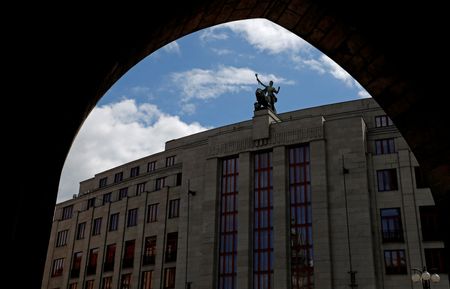By Jason Hovet and Jan Lopatka
PRAGUE (Reuters) -The Czech National Bank left interest rates unchanged again on Thursday and said its policymakers saw upside inflation risks from wage growth and potential government spending, although it did not commit to any direction in future policy decisions.
The bank’s new forecasts indicated broad rate stability over the next few quarters, followed by a gradual rise in market rates, a proxy for the bank’s policy rate – a more hawkish view than the outlook it published in August which still saw room for easing.
Policymakers last cut rates in May to bring the central bank’s main two-week repo rate to 3.50%, meaning it has lowered rates by 350 basis points in all since the end of 2023.
But the board has shied away from any further cuts, with service price inflation still running close to 5%, housing lending accelerating in a rising real estate market and wages picking up in a rebounding economy.
An election last month is also bringing in a new government promising looser fiscal policy that can give a short-term boost to growth, as well as inflation.
NO COMMITMENT ON NEXT MOVE
Asked whether cuts were likely over, Governor Ales Michl however said board members did not commit to any future direction of policy moves.
“We are keeping all options open, be it down or up, and we will proportionally react to risks,” Michl told a news conference.
The board said in a statement that credit growth was gradually increasing and the labour market remained tight.
“Given the current and expected developments, relatively tight monetary policy is still needed.”
RATE STABILITY THE GENERAL VIEW
Most analysts in a Reuters poll last week forecast no change in rates this year and throughout 2026, although some said the economy might underperform, opening up space for further easing.
The central bank’s new outlook on Thursday saw growth lower this year and next at 2.3% and 2.4% respectively, down from a previous forecast of 2.6% for each year.
The outlook is more in line with the Finance Ministry, which on Thursday raised its 2025 and 2026 forecasts – to 2.4% and 2.2% – driven by stronger wage growth.
Headline inflation picked up to 2.5% last month, staying toward the top end of the bank’s 1 percentage point tolerance band around its 2% target.
The bank saw average inflation easing to 2.2% in 2026, from 2.5% seen this year.
Michl did not comment on populist billionaire Andrej Babis’ return to power after his ANO party won an October election with promises of lower taxes, higher wages and more benefits like mortgage subsidies.
He said the bank would analyse fiscal plans once they take clear shape.
(Reporting by Jan Lopatka and Jason Hovet; Editing by Emelia Sithole-Matarise and Hugh Lawson)









